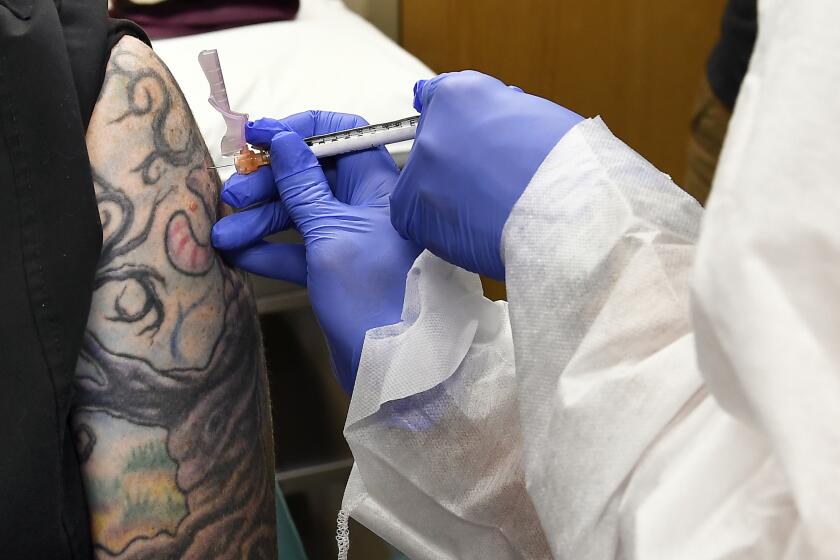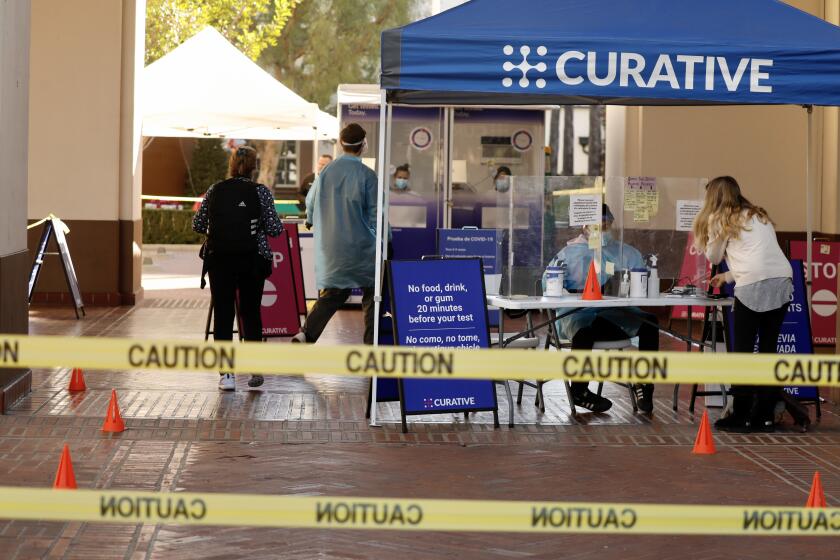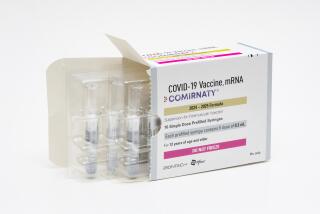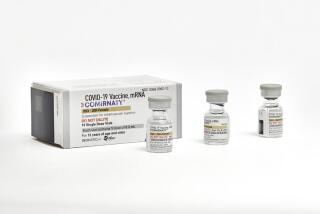U.S., Pfizer strike deal for 100 million additional doses of COVID-19 vaccine
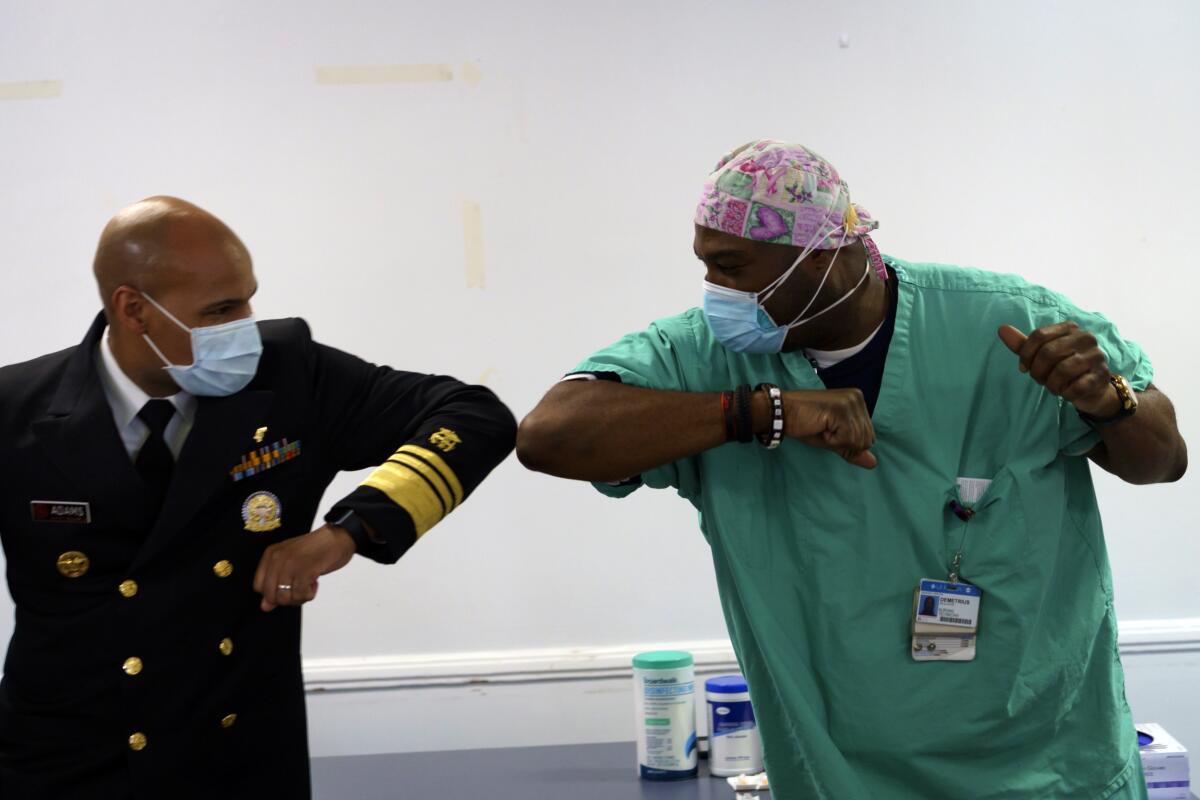
- Share via
WASHINGTON — Pfizer and BioNTech will supply the U.S. with an additional 100 million doses of their COVID-19 vaccine under a new agreement announced Wednesday.
The drugmakers said that they expect to deliver by July 31 all the doses covered by the nearly $2-billion deal.
Pfizer already has a contract to supply the government with 100 million doses of its vaccine.
Under the agreement announced Wednesday, the companies will deliver at least 70 million of the additional doses by June 30, with the remaining 30 million doses to be delivered no later than the end of July. The government also has the option to acquire up to an additional 400 million doses.
“With these 100 million additional doses, the United States will be able to protect more individuals and hopefully end this devastating pandemic more quickly,” said Pfizer CEO Albert Bourla. “We look forward to continuing our work with the U.S. government and healthcare providers around the country.”
Health and Human Services Secretary Alex Azar said in a statement that the latest deal can give people confidence “that we will have enough supply to vaccinate every American who wants it by June 2021.”
Pfizer’s vaccine was the first to gain approval from the Food and Drug Administration and initial shipments went to states last week. It has been joined by a vaccine from Moderna, which was developed in closer cooperation with scientists from the National Institutes of Health.
If the COVID-19 vaccine from Pfizer and BioNTech was good enough to get a nod from the FDA, the vaccine from Moderna and the NIH almost certainly is as well.
A law dating to the Korean War gives the government authority to direct private companies to produce crucial goods in times of national emergency. Called the Defense Production Act, it could be used to help Pfizer secure supplies including needed chemicals, vials and containers, and materials to keep its vaccine super-cold. The person who spoke to the AP about the negotiations described using the defense law as an option under consideration.
Moderna’s vaccine was developed in close collaboration with the government’s own effort, which is called Operation Warp Speed. It was designed to have millions of vaccine doses ready and available to ship once a shot received FDA approval.
Pfizer has a contract to supply the government with 100 million doses of its vaccine under Operation Warp Speed, but government officials have said it’s more of an arm’s-length relationship with the company and they don’t have as much visibility into its operations.
Having tens of millions more doses from Pfizer would help the U.S. keep up the pace of vaccinations through the winter and into the spring, moving the nation closer to the goal of vaccinating all Americans.
Assuming a negative coronavirus test means it’s OK to attend gatherings “is a very dangerous strategy,” L.A. County’s health services director says.
Pfizer said in a statement Tuesday that “we continue to work collaboratively with the U.S. government to get doses of our COVID-19 vaccine to as many Americans as possible. The company is not able to comment on any confidential discussions that may be taking place with the U.S. government.”
The vaccine from Pfizer and German pharmaceutical BioNTech immediately raised hopes of taming a pandemic that has killed nearly 320,000 people in the U.S. and hobbled much of the national economy. Healthcare workers and nursing home residents topped the list as local TV stations across the country began broadcasting scenes of the first vaccinations. Some polls show skepticism about getting vaccinated may be easing.
After early failures with testing, Trump administration officials are hoping to write a very different ending with vaccines. Operation Warp Speed has financed the development, manufacture and distribution of millions of doses, with the goal of providing a free vaccine to any American who wants one.
Operation Warp Speed is on track to have about 40 million doses of vaccine by the end of this month, of which about 20 million would be allocated for first vaccinations. Distribution of those doses would span into the first week of January. Both the Pfizer and Moderna vaccines require two shots to be fully effective.
The New York Times first reported the new details of negotiations between Pfizer and the Trump administration.
More to Read
Sign up for Essential California
The most important California stories and recommendations in your inbox every morning.
You may occasionally receive promotional content from the Los Angeles Times.
